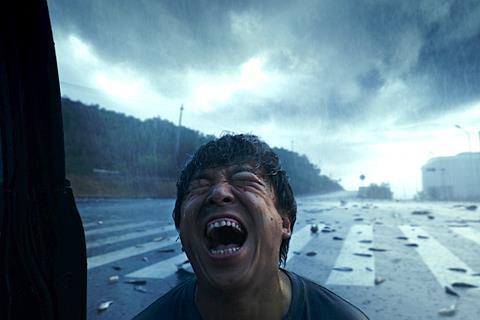Huang Bo plays a bereaved father who embarks on a furious revenge mission in Cao Baoping’s relentless China- and Tokyo-set thriller

Dir. Cao Baoping. China. 2023. 144mins
This adaptation of Lao Huang’s 2015 novel about a father pursuing vengeance for the murder of his daughter is one of the most relentless Chinese thrillers in recent memory. Yet it isn’t solely focused on the hunt. Anchored by riveting performances from Huang Bo and Zhou Xun, Across the Furious Sea also delivers a staunch critique of parenting approaches across China’s social-economic divide.
One of the most relentless Chinese thrillers in recent memory
The film has experienced a prolonged voyage to the multiplex; this star-driven thriller from crime specialist Cao Baoping was shot in 2019 with a planned 2021 release date, only for it to be stranded in Covid limbo. In this respect, it shares a kinship with Zhang Yimou’s similarly delayed procedural Under The Light but, whereas Zhang’s film was riddled with signs of post-production compromise, Cao’s appears unscathed.
Continuing this year’s run of commercially successful mid-range or art-house leaning thrillers such as Dust to Dust, Last Suspect and Only the River Flows, advance ticket sales were brisk for Across The Furious Sea, which topped the Chinese box office with $24.7m across its two day opening weekend. Aided by the presence of the perennially popular Huang Bo, this marks a well-deserved mainstream breakthrough for Cao whose previous neo-noirs The Dead End (2015) and Cock And Bull (2016) performed decently but remained relatively under the radar despite the director’s craftsmanship.
Internationally, the film should exert its grip at Asian-themed festivals, particularly those with a genre angle, and streaming prospects are strong for this rare Chinese thriller that evinces the courage of its convictions when it comes to probing its murky thematic depths.
Running a fishing business means that Lao Jin (Huang Bo) is away at on a trawler for weeks at a time. He does this to support his daughter Nana (Zhou Yiran) who is attending university in Japan. When his ex-wife Gu Hong (Yan Ni) calls to say to that Nana has gone missing, Lao Jin flies to Tokyo to enquire about her whereabouts. He is only a day into his search when Nana is found dead, stabbed 17 times. The prime suspect is her boyfriend and fellow international student Li Miaomiao (Zhang Youhao), but he flees home before an arrest can be made.
Seeking vengeance, Lao Jin heads back to China where he tries to locate Li Miaomiao by breaking into the palatial home of his estranged father Li Lie (Zu Feng), but to no avail. It transpires that Li Miaomiao is instead being aided by his mother, upwardly mobile divorcee Jing Lan (Zhou Xun), who vows to protect her son regardless of his copious negative traits. Lao Jin and Jing Lan mutually instigate a battle of wits, with matters escalating across a series of increasingly combustible confrontations.
Whatever dust the film had gathered from sitting on the shelf is shaken off within the initial 90 minutes which move at a tremendous clip due to Yan Yiping’s taut editing and Cao’s efficient storytelling. Cao demonstrated considerable flair with The Dead End, which culminated in a vertiginous skyscraper set piece; he comes close to topping that here, when a pursuit through a convention centre packed with ghoulish cosplayers ends up on the perilously curved roof.
Yet the truly bravura technical display is a borderline biblical freeway chase that occurs just as Tornado Hagibis hits mainland China, with the updraft causing fish to rain from the sky. As the forces of nature and ensuing vehicular carnage are synched to the fraught emotions of the film’s combative parents, this brilliantly-executed sequence constitutes an audacious second act crescendo.
Although the structural dynamics of Across The Furious Sea court comparison with myriad South Korean thrillers, its societal complexities are rooted in China’s current familial strife. At the outset, the film appears to be an exercise in class warfare. Lao Jin is a rugged seafarer who thinks entirely in terms of the number of fish he needs to catch and the number of nets he needs to catch them. Meanwhile, the nouveau riche Jing Lian is a self-described “mother wolf with claws” who has visa offices on speed dial. Yet it is their respective parental shortcomings that have inadvertently caused tragedy. Lao Jin practices a “tough love” approach that can easily be misconstrued as a lack of emotion, while Jing Lan has indulged her offspring to the extent that he makes no apologies for his worst tendencies.
When the chase winds down, it’s Cao’s unsparing examination of these flawed parenting strategies that gives the film a gut-wrenching power in the extended final stretch. Beloved for his comedic turns, Huang has taken against-type detours before but hits a new level of intensity as a bereaved father who is not so much consumed by rage as blinded by it. Meanwhile, Zhou Xun proves to be a deceptively icy counterpart, dropping choice ironies with elegant aplomb.
Also of note is Zhou Yiran who takes centre stage in off-kilter flashbacks that play like a less hedonistic variation on the equivalent strand in Tetsuya Nakashima’s The World Of Kanako (2014). If Cao and co-screenwriters Wu Pipi and Jiao Huajing succumb to the reductive manic pixie dream girl trope, Zhou Yiran cannot be faulted for her immersion in Nana’s ill-fated overseas odyssey.
Production companies: Beijing Standard Image Culture, Lian Ray Pictures
International sales: Lian Ray Pictures, international@lianraypictures.cn
Producers: Dong Chenchen, Cao Baoping, Liang Tongyu, Mao Chuxiao, Gao Ziqing
Screenplay: Cao Baoping, Wu Pipi, Jiao Huajing
Editing: Yan Yiping
Cinematography: Li Ran
Music: Guo Sida
Main cast: Huang Bo, Zhou Xun, Zu Feng, Zhang Youhao, Zhou Yiran, Yan Ni















![[L-R]: Amanda Villavieja, Laia Casanovas, Yasmina Praderas](https://d1nslcd7m2225b.cloudfront.net/Pictures/274x183/6/4/1/1471641_pxl_20251224_103354743_618426_crop.jpg)








